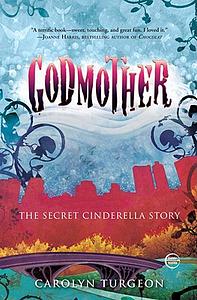Take a photo of a barcode or cover
Review published here: http://www.hipsterbookclub.com/reviews/copy/0609/godmother_carolyn_turgeon.html
Carolyn Turgeon's Godmother: The Secret Cinderella Story is a quirky and offbeat retelling of the classic fairy tale, brought up to date for an adult audience. While preserving the basic, familiar features of the original story, Turgeon introduces readers to an often overlooked and underappreciated part of the story: the fairy godmother. Her interpretation is less Walt Disney than Brothers Grimm, hitting on themes of redemption and forgiveness.
The godmother of this story, Lil, is a fallen fairy now living in present-day New York City after being banished from her magical land. Though she still has her wings, which she keeps hidden under wraps, Lil has lost her magic and is stuck in an aging human form. Now an old lady with white hair, sunken eyes, and a heavy heart, Lil often reflects upon her youth in the fairy kingdom. Chapters alternate between Lil's previous life as a beautiful fairy and her current state. As the story unravels, it becomes clear that Lil made a terrible mistake in her former life that has caused her to live the rest of her days in a kind of purgatory until she is forgiven. Lil believes that if she can play matchmaker once again and cause two of her lonely young friends to fall in love with each other, she will be redeemed, liberated from her human form, and invited back to the fairy land.
The traditional Cinderella story is aimed at a younger audience and has a more transparent and easily digestible theme. Turgeon's version illustrates how people can become their own worst enemies through denial and self-loathing. While there are still touches of whimsy sprinkled throughout the book (like the quaint rare bookstore in which human Lil works) the story is very dark at its core, dealing with some intense issues. Turgeon strikes a good balance between the heavy themes and fantastical aspects of the story, managing to make Godmother relevant enough to be taken seriously but light enough to not be overwhelming or depressing.
One of Turgeon's real gifts is her ability to show, through her writing, the magic of modern, everyday life. Her beautifully written descriptions of New York City rival those of Lil's magical fairy kingdom. Turgeon obviously loves the city and excels at describing the enchanting old city glamour and gritty bohemian districts. It's enough to make a seasoned city dweller want to take a walk around his or her own neighborhood with fresh eyes and discover new charms.
Godmother does have its problems, however—namely, the characters. Lil is the only truly developed character of the book, and her self-loathing and timidity can be bothersome. Yes, she made a horrible mistake in the past and is overcome with a mix of guilt and desire, but there is never any reason for readers to side with her. She is pitiable but not actually likable. The two main supporting characters, the two lonely hearts Lil attempts to unite, are underdeveloped and insignificant. Readers learn next to nothing about the man, George, except that he is handsome, educated, and a bit gloomy. Turgeon must have forgotten to give him a personality or didn't deem one necessary. His polar opposite, Veronica, has an excess of personality, as if Turgeon tried to fit too much into one character and instead ended up with a caricature. Veronica is a loveable oddball , frenzied but caring, friendly but sarcastic, confident but self-deprecating. She's supposed to be young and hip—sewing her own clothes, owning a hair salon, in love with old Hollywood and vintage ephemera, even publishing a blog—but comes across as clichéd and overdone. Veronica and George are intended to be modern versions of Cinderella and the prince, but they elicit no emotion and therefore only serve Lil's plot to bring another young couple together.
Character disappointments aside, the book is well crafted and imaginative. Rather than simply retelling a well-known story from a different perspective, Turgeon turns the tale upside down to reveal a darker side, tackling profound themes of redemption and forgiveness. It's an enjoyable mix of sweet and bitter, light and dark, magic and realism.
Carolyn Turgeon's Godmother: The Secret Cinderella Story is a quirky and offbeat retelling of the classic fairy tale, brought up to date for an adult audience. While preserving the basic, familiar features of the original story, Turgeon introduces readers to an often overlooked and underappreciated part of the story: the fairy godmother. Her interpretation is less Walt Disney than Brothers Grimm, hitting on themes of redemption and forgiveness.
The godmother of this story, Lil, is a fallen fairy now living in present-day New York City after being banished from her magical land. Though she still has her wings, which she keeps hidden under wraps, Lil has lost her magic and is stuck in an aging human form. Now an old lady with white hair, sunken eyes, and a heavy heart, Lil often reflects upon her youth in the fairy kingdom. Chapters alternate between Lil's previous life as a beautiful fairy and her current state. As the story unravels, it becomes clear that Lil made a terrible mistake in her former life that has caused her to live the rest of her days in a kind of purgatory until she is forgiven. Lil believes that if she can play matchmaker once again and cause two of her lonely young friends to fall in love with each other, she will be redeemed, liberated from her human form, and invited back to the fairy land.
The traditional Cinderella story is aimed at a younger audience and has a more transparent and easily digestible theme. Turgeon's version illustrates how people can become their own worst enemies through denial and self-loathing. While there are still touches of whimsy sprinkled throughout the book (like the quaint rare bookstore in which human Lil works) the story is very dark at its core, dealing with some intense issues. Turgeon strikes a good balance between the heavy themes and fantastical aspects of the story, managing to make Godmother relevant enough to be taken seriously but light enough to not be overwhelming or depressing.
One of Turgeon's real gifts is her ability to show, through her writing, the magic of modern, everyday life. Her beautifully written descriptions of New York City rival those of Lil's magical fairy kingdom. Turgeon obviously loves the city and excels at describing the enchanting old city glamour and gritty bohemian districts. It's enough to make a seasoned city dweller want to take a walk around his or her own neighborhood with fresh eyes and discover new charms.
Godmother does have its problems, however—namely, the characters. Lil is the only truly developed character of the book, and her self-loathing and timidity can be bothersome. Yes, she made a horrible mistake in the past and is overcome with a mix of guilt and desire, but there is never any reason for readers to side with her. She is pitiable but not actually likable. The two main supporting characters, the two lonely hearts Lil attempts to unite, are underdeveloped and insignificant. Readers learn next to nothing about the man, George, except that he is handsome, educated, and a bit gloomy. Turgeon must have forgotten to give him a personality or didn't deem one necessary. His polar opposite, Veronica, has an excess of personality, as if Turgeon tried to fit too much into one character and instead ended up with a caricature. Veronica is a loveable oddball , frenzied but caring, friendly but sarcastic, confident but self-deprecating. She's supposed to be young and hip—sewing her own clothes, owning a hair salon, in love with old Hollywood and vintage ephemera, even publishing a blog—but comes across as clichéd and overdone. Veronica and George are intended to be modern versions of Cinderella and the prince, but they elicit no emotion and therefore only serve Lil's plot to bring another young couple together.
Character disappointments aside, the book is well crafted and imaginative. Rather than simply retelling a well-known story from a different perspective, Turgeon turns the tale upside down to reveal a darker side, tackling profound themes of redemption and forgiveness. It's an enjoyable mix of sweet and bitter, light and dark, magic and realism.
dark
emotional
hopeful
mysterious
sad
medium-paced
Plot or Character Driven:
A mix
Strong character development:
N/A
Loveable characters:
Yes
Diverse cast of characters:
N/A
Flaws of characters a main focus:
Yes
While there were some eyebrow raising parts, I actually liked the story...until the end. It just left me going "huh?!?!"
Brilliant book with a different take on Cinderella!
Why is there no more book? That can't be how it ends! It took me right up until the last chapter to really get into the book. Most of the book didn't really grab my attention. Up to that last chapter it was just an easy read, relaxing with no real substance. I'm still sort of reeling from reading it and it will have me thinking for a while so it achieved that if not much else.
Why is there no more book? That can't be how it ends! It took me right up until the last chapter to really get into the book. Most of the book didn't really grab my attention. Up to that last chapter it was just an easy read, relaxing with no real substance. I'm still sort of reeling from reading it and it will have me thinking for a while so it achieved that if not much else.
I was expecting a fun chick lit book but this was very dark.
Not the sort of book I would usually read but quick and easy to digest with some nice moments.
Great premise, great potential, absolutely terrible horrible lame ending.
Not the light read I was expecting, this book walks a tightrope between fact and fantasy and it's difficult to determine what is which.
Is Lil Cinderella's fairy godmother, banished from faerie for falling in love with Prince Charming or is she is senile old woman, confusing her sister's tragic death with a beloved story?
There is no definitive answer so it is for the reader to decide - a unique and imaginitive story that will likely polarise the readership. Put your preconceptions aside and choose your own ending.
Is Lil Cinderella's fairy godmother, banished from faerie for falling in love with Prince Charming or is she is senile old woman, confusing her sister's tragic death with a beloved story?
There is no definitive answer so it is for the reader to decide - a unique and imaginitive story that will likely polarise the readership. Put your preconceptions aside and choose your own ending.




